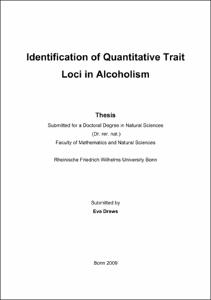Drews, Eva: Identification of Quantitative Trait Loci in Alcoholism. - Bonn, 2009. - Dissertation, Rheinische Friedrich-Wilhelms-Universität Bonn.
Online-Ausgabe in bonndoc: https://nbn-resolving.org/urn:nbn:de:hbz:5N-18156
Online-Ausgabe in bonndoc: https://nbn-resolving.org/urn:nbn:de:hbz:5N-18156
@phdthesis{handle:20.500.11811/4098,
urn: https://nbn-resolving.org/urn:nbn:de:hbz:5N-18156,
author = {{Eva Drews}},
title = {Identification of Quantitative Trait Loci in Alcoholism},
school = {Rheinische Friedrich-Wilhelms-Universität Bonn},
year = 2009,
month = jul,
note = {The aim of the present study was the identification of chromosomal loci that contribute to the development and manifestation of behaviours related alcohol drinking and alcohol withdrawal. For this purpose, a serial behavioural phenotyping of 534 animals from the second filial (F2) generation of a C57BL/6J and C3H/HeJ mice intercross in paradigms with relevance to alcohol dependence was performed. Traits assessed comprised acute and chronic ethanol effects, ethanol consumption and preference as well as ethanol withdrawal-related traits. Genotypes of all mice were assessed by microsatellite marker mapping. For this purpose, 264 markers with an average marker distance of 5.56 cM were genotyped, which represents a high-density whole genome coverage. Quantitative trait loci (QTL) were subsequently identified using univariate analysis performed with the R/qtl tool, which is an extensible, interactive environment for mapping QTL in experimental crosses. QTL were found that have already been published, thus validating the serial phenotyping protocol, and several novel loci were identified. The analysis demonstrates that the various responses to ethanol are regulated by independent groups of genes. Further this study provides first data showing interaction patterns between alcohol-related traits.},
url = {https://hdl.handle.net/20.500.11811/4098}
}
urn: https://nbn-resolving.org/urn:nbn:de:hbz:5N-18156,
author = {{Eva Drews}},
title = {Identification of Quantitative Trait Loci in Alcoholism},
school = {Rheinische Friedrich-Wilhelms-Universität Bonn},
year = 2009,
month = jul,
note = {The aim of the present study was the identification of chromosomal loci that contribute to the development and manifestation of behaviours related alcohol drinking and alcohol withdrawal. For this purpose, a serial behavioural phenotyping of 534 animals from the second filial (F2) generation of a C57BL/6J and C3H/HeJ mice intercross in paradigms with relevance to alcohol dependence was performed. Traits assessed comprised acute and chronic ethanol effects, ethanol consumption and preference as well as ethanol withdrawal-related traits. Genotypes of all mice were assessed by microsatellite marker mapping. For this purpose, 264 markers with an average marker distance of 5.56 cM were genotyped, which represents a high-density whole genome coverage. Quantitative trait loci (QTL) were subsequently identified using univariate analysis performed with the R/qtl tool, which is an extensible, interactive environment for mapping QTL in experimental crosses. QTL were found that have already been published, thus validating the serial phenotyping protocol, and several novel loci were identified. The analysis demonstrates that the various responses to ethanol are regulated by independent groups of genes. Further this study provides first data showing interaction patterns between alcohol-related traits.},
url = {https://hdl.handle.net/20.500.11811/4098}
}






